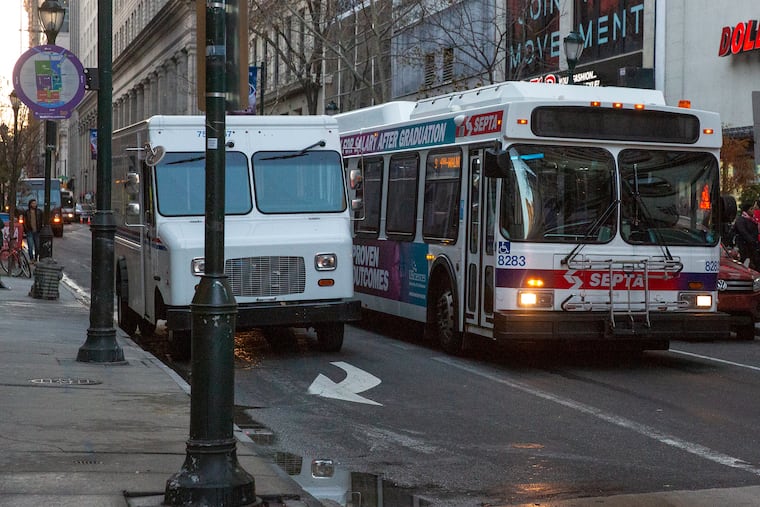Eureka! Philly discovers that enforcement works | Stu Bykofsky
So why are traffic laws not enforced all the time?

Great moments in human enlightenment:
1514: Nicolaus Copernicus postulates that the sun is the center of our solar system.
1687: Sir Isaac Newton publishes theory of gravity.
2019: Philadelphia Deputy Managing Director Mike Carroll theorizes that “enforcement does work” when it comes to unclogging Center City traffic.
That’s why, for the next month, the Troika of the Ticket Book — the Philadelphia Parking Authority, SEPTA, Philadelphia Police Department — will be pounding the hammer of “enhanced enforcement” on violators, according to the city.
As you may know, enforcement is in my wheelhouse. A life lesson: Laws that are not enforced are ignored, and laws that are ignored lead to other laws being ignored and a general disrespect for the rule of law. The disrespect spreads like an oil slick.
You know who doesn’t like enforcement? People who break the law. Duh! Another life lesson: Most of them don’t think they are bad people. They’re just #MeFirst.
If that’s you, be warned that tickets will fall like rain on Chestnut from Seventh to 23rd Streets and on Market from Seventh to 13th.
Why were those blocks selected?
“This is where we have bus lanes that go through Center City,” Carroll tells me — buses that often are blocked by cars or trucks in their lane. One illegally stopped car can delay 40 bus passengers. Is that fair to them?
If enforcement works, why have it only on special occasions? Are other laws enforced only during select periods?
“We are enforcing different laws all of the time,” says Carroll, who doesn’t want to second-guess police “who are busy all of the time.”
Sorry, selective enforcement results in selective obedience. Curing the problem of selfish drivers requires enforcement all the time.
“Enhanced enforcement” got a five-month tryout last fall, starting Sept. 2. During that period, according to city stats, 3,635 tickets were written in the targeted zone (1,347 on Market and 2,299 on Chestnut). The focus of enforcement was bus, bike, and right-turn-only lanes, with special attention given to moving violations.
Enforcement brought a 6.4 percent improvement in transit travel times during the midday period, the city says.
The “enhanced enforcement” was reflected in my annual column in February analyzing various kinds of enforcement — from automobile moving violations to pot smoking.
In 2018, police wrote 97,216 tickets to motorists, up 14 percent from the 84,820 in 2017. Tickets written by police to motorists who were in bike lanes rose to 764 in 2018, 60 percent higher than the 472 tickets in 2017.
The increase reflected “several initiatives regarding traffic congestion in Center City,” I was told by Philadelphia Police spokesperson Capt. Sekou Kinebrew.
PPA parking enforcement officers write more tickets than cops because PEOs don’t do anything else and cops too often think writing tickets is beneath them. I have tracked the overall reduction in moving violations written by cops over the years and kvetched about it to no avail.
Cops wrote 97,216 tickets in 2018, contrasted with 252,083 in 2008, a decade earlier. That’s a drop of almost two-thirds.
They will write more tickets only when commanders make it a priority.
It’s clear that the increase of tickets for motorists violating the bike lane resulted from the Bicycle Coalition of Greater Philadelphia turning up the heat. The bike coalition is an effective lobbying group, with outsize clout.
The coalition approves of enforcement “as a tool for safer streets,” but believes ticket blitzes don’t work well over the long term “because the motorist knows after the time period ends, it’s back to parking wherever you want again,” says spokesperson Randy LoBasso.
He’s right. The solution, as I mentioned above, is constant enforcement. That’s how you change bad behavior.